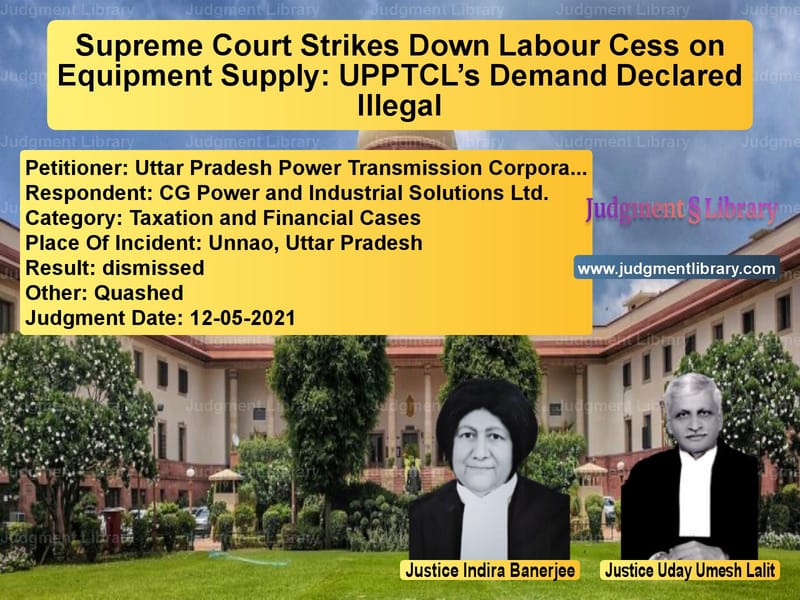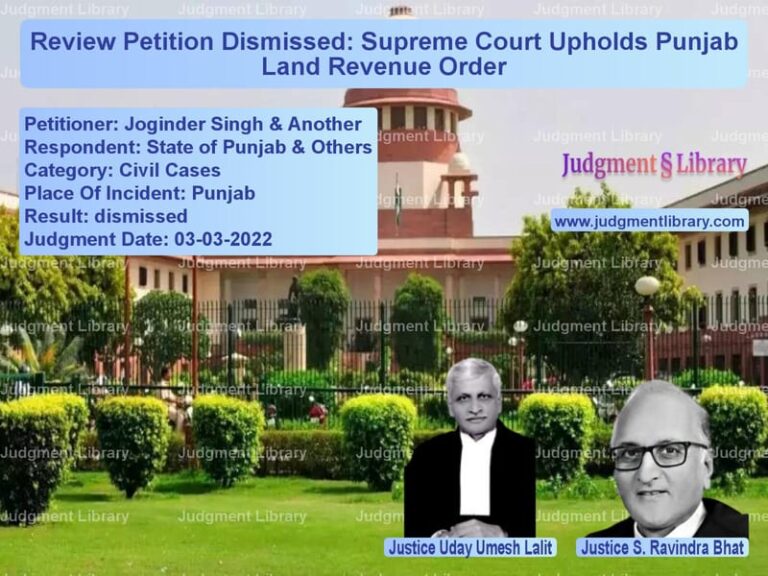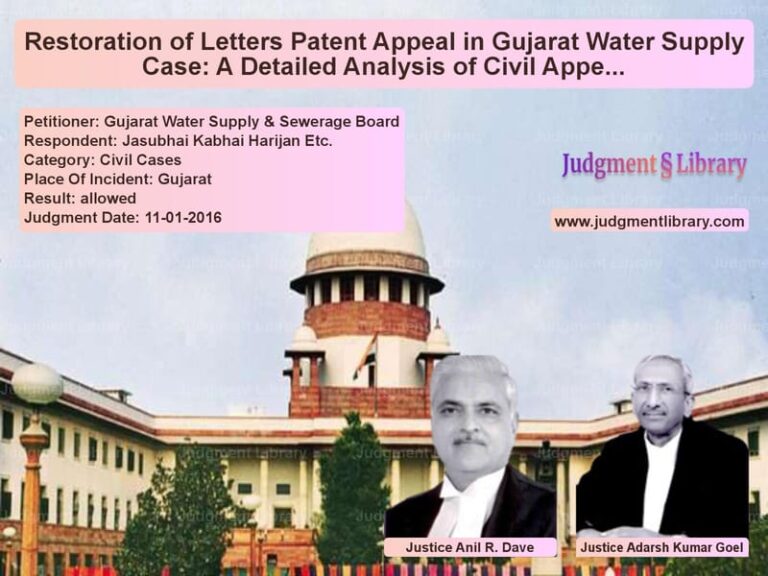Supreme Court Strikes Down Labour Cess on Equipment Supply: UPPTCL’s Demand Declared Illegal
The Supreme Court of India has delivered a crucial verdict in Uttar Pradesh Power Transmission Corporation Ltd. (UPPTCL) v. CG Power and Industrial Solutions Ltd., ruling that labour cess under the Building and Other Construction Workers’ Welfare Cess Act, 1996 (Cess Act) cannot be levied on supply contracts. The judgment, delivered on May 12, 2021, upheld the Allahabad High Court’s decision setting aside the demand for cess by UPPTCL on a supply contract.
Background of the Case
The case arose from a contractual agreement between UPPTCL and CG Power and Industrial Solutions Ltd. for the construction of a 765/400 kV Substation at Unnao, Uttar Pradesh. The contract was structured into four separate agreements:
- First Contract: Supply of equipment and materials.
- Second Contract: Handling, erection, testing, and commissioning.
- Third Contract: Civil works.
- Fourth Contract: Three-year operations and maintenance.
UPPTCL issued letters demanding payment of labour cess amounting to Rs. 2,60,68,814 under the Cess Act, computed at 1% of the total contract value, including the supply component. CG Power challenged this demand before the Allahabad High Court.
Arguments by the Petitioner (UPPTCL)
UPPTCL, represented by its counsel, argued:
- The labour cess was applicable to all components of the project, including supply of equipment.
- The CAG audit report had pointed out non-deduction of cess, making it necessary for UPPTCL to recover the amount.
- CG Power was liable as the contractor under Section 2(1)(g) of the Building and Other Construction Workers’ (Regulation of Employment and Conditions of Service) Act, 1996 (BOCW Act).
- UPPTCL had the right to deduct cess from CG Power’s invoices or recover it from performance bank guarantees.
Arguments by the Respondent (CG Power and Industrial Solutions Ltd.)
CG Power countered UPPTCL’s claims, stating:
- The first contract was a pure supply contract and did not involve construction work.
- Labour cess under the Cess Act is applicable only to building and construction activities, not to supply contracts.
- Several public sector entities like Delhi Metro Rail Corporation and Karnataka Power Transmission Corporation had issued directives clarifying that cess was not applicable to supply contracts.
- UPPTCL’s action of withholding payments and invoking bank guarantees was illegal, as there was no assessment of cess under the statutory procedure.
Supreme Court’s Observations and Judgment
1. Scope of the BOCW Act and Cess Act
The Supreme Court examined the legislative intent of the BOCW Act and the Cess Act. It noted:
“The BOCW Act was enacted to provide welfare measures for workers engaged in building and construction activities. It does not cover supply contracts that do not involve deployment of building workers.”
2. Exemption of Supply Contracts from Labour Cess
The Court ruled that cess can be levied only on construction work, stating:
“Cess under the Cess Act is leviable on construction works as defined in Section 2(1)(d) of the BOCW Act. Mere supply of equipment and materials does not fall within this definition.”
3. No Power to Deduct Cess on Supply Contracts
The Supreme Court rejected UPPTCL’s argument that it could recover cess through bank guarantees or invoice deductions, holding:
“There is no provision in the contract that allows UPPTCL to deduct cess from invoices or recover it through performance guarantees when there is no statutory assessment.”
4. Rejection of CAG Audit Report as Sole Basis
The Court dismissed the reliance on the CAG report, ruling:
“An audit objection cannot be the sole basis for imposing cess. Recovery must follow the statutory procedure under the Cess Act and Rules.”
5. Alternative Remedy Not a Bar to Writ Petition
The Supreme Court held that CG Power was entitled to seek relief through a writ petition, despite the presence of an arbitration clause in the contract:
“The existence of an arbitration clause does not bar judicial review when fundamental rights or statutory compliance are at stake.”
Final Verdict
The Supreme Court upheld the Allahabad High Court’s ruling, stating:
“The demand for cess on the first contract is illegal and cannot be sustained. UPPTCL’s letters demanding payment of Rs. 2,60,68,814 are set aside.”
Conclusion
This judgment establishes a crucial precedent in tax and contractual law, ensuring that supply contracts remain free from improper taxation under the BOCW Act and Cess Act. It also reinforces the principle that statutory levies cannot be imposed arbitrarily and must follow due process.
Petitioner Name: Uttar Pradesh Power Transmission Corporation Ltd..Respondent Name: CG Power and Industrial Solutions Ltd..Judgment By: Justice Indira Banerjee, Justice Uday Umesh Lalit.Place Of Incident: Unnao, Uttar Pradesh.Judgment Date: 12-05-2021.
Don’t miss out on the full details! Download the complete judgment in PDF format below and gain valuable insights instantly!
Download Judgment: uttar-pradesh-power-vs-cg-power-and-industr-supreme-court-of-india-judgment-dated-12-05-2021.pdf
Directly Download Judgment: Directly download this Judgment
See all petitions in Tax Refund Disputes
See all petitions in Judgment by Indira Banerjee
See all petitions in Judgment by Uday Umesh Lalit
See all petitions in dismissed
See all petitions in Quashed
See all petitions in supreme court of India judgments May 2021
See all petitions in 2021 judgments
See all posts in Taxation and Financial Cases Category
See all allowed petitions in Taxation and Financial Cases Category
See all Dismissed petitions in Taxation and Financial Cases Category
See all partially allowed petitions in Taxation and Financial Cases Category







